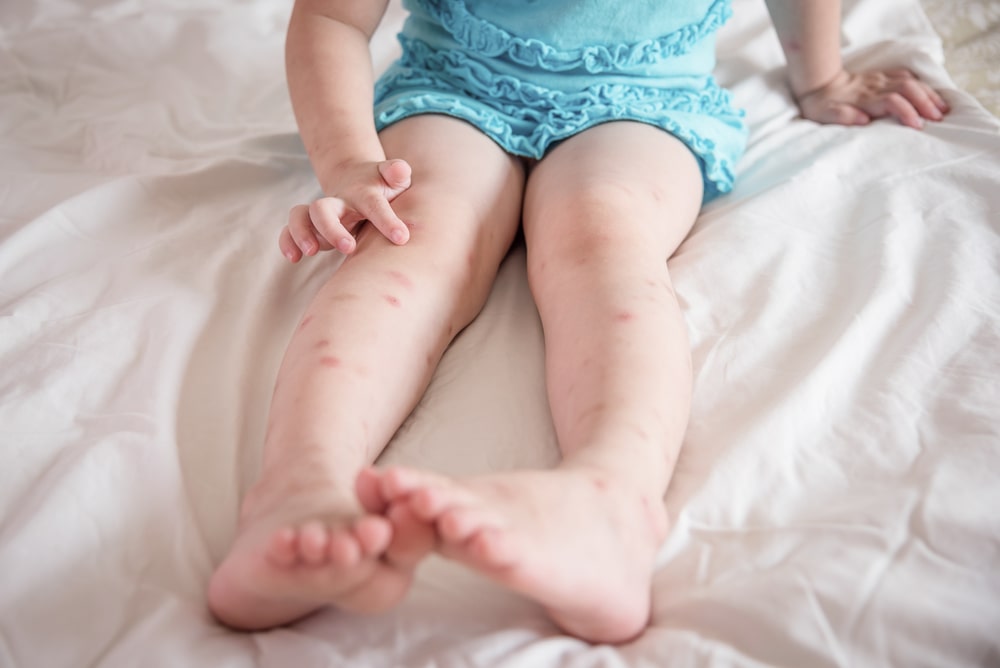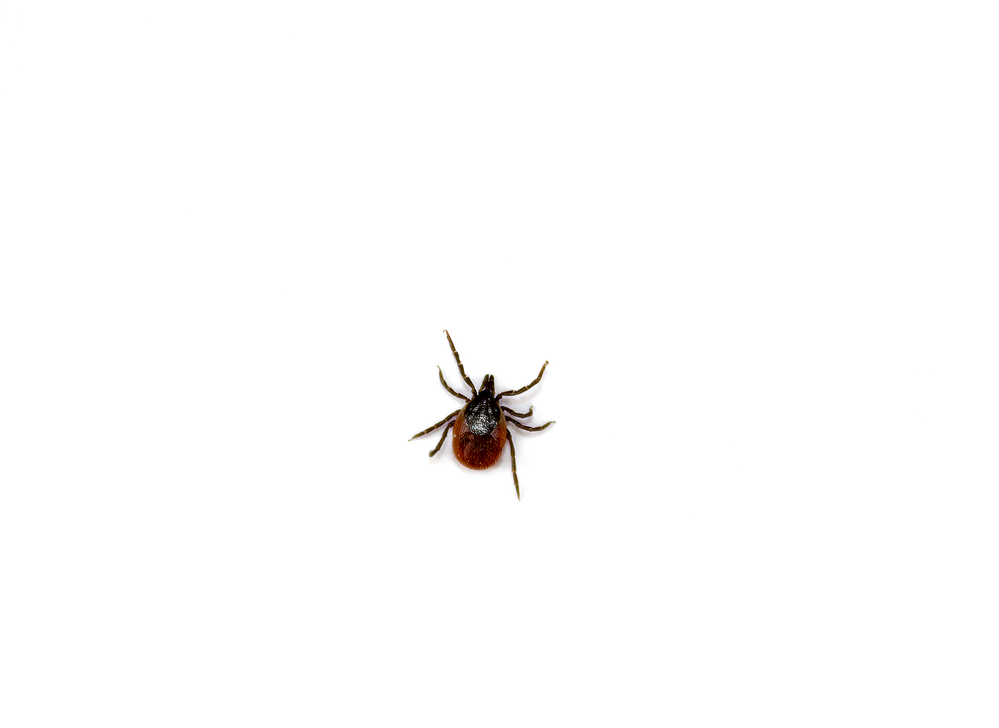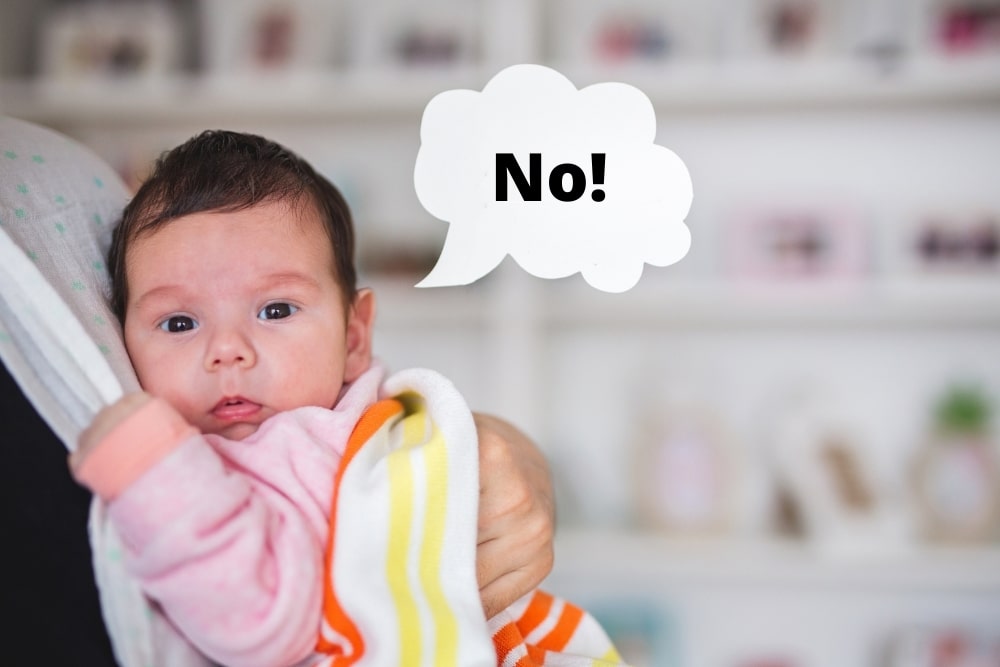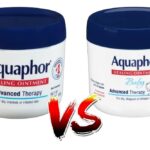If you have or have ever had pets you know what it is like when you get pests such as fleas in your home – they can be difficult to get rid of. But if you have a baby in the house it can be even more complicated and difficult to treat the problem!
Most flea remedies involve some nasty chemicals and pesticides that are not good for anyone but could be potentially hazardous to your baby.
However, if you would like to avoid a concoction of chemicals in your home and around your baby, there are some natural home remedies that you can make from household ingredients that will also do the job.
If you and your baby are living with the risk of flea contact then it is important that they sleep well above floor level and also wear clothing that covers their arms and legs fully.
In this article, we have looked at the most common traditional cures for fleas, natural flea cures, and the impact and potential hazards that they pose for your baby.
Are Fleas Dangerous For Babies?
For anyone that doesn’t know what a flea is, they are small flightless insects that survive as external parasites on mammals and birds.
Fleas grow no bigger than the tip of a pen and live by consuming the blood of their host. Fleas move around by jumping from place to place and they reproduce at a tremendous rate especially if you have pets in the house.
Even if you do not have pets your backyard can still play host to fleas and they can be extremely difficult to get rid of.
Due to the fact that babies tend to lie and crawl on the floor, they are more prone to being bitten by fleas. You may notice a few raised red bumps on your infant.
View in gallery
There are a few ways to tell if the bumps are flea bites or something else. Here are a few things to watch out for that are synonymous with flea bites:
- They would be small and will be clustered in a group of two or three bites.
- The bites will usually be around your baby’s joints, such as ankles or knees
For the majority of babies that get a flea bite, it will not cause any major health concerns other than it is extremely itchy and uncomfortable for your baby. But there are some potential risks such as infection, allergic reactions, or even tapeworm.
Preventing Infection
Flea bites can easily become infected and your baby will be more prone to this than an adult due to their immature immune system, the fact they will instinctively scratch at them and as a result, open up the skin around them.
The best way to prevent infection in your baby is to ensure that their nails are cut short and that you wash the bites thoroughly with soap and water.
You could also use a cold compress to help reduce the swelling and also provide some comfort from the itching.
Flea Bite Dermatitis
Babies are at greater risks from potential allergies and some children are actually allergic to the proteins found in flea saliva.
This then causes an allergic reaction that affects a much larger area of skin. A reaction to a bite is easy to identify as they will be surrounded by a circle of red and swollen skin.
If you are unfortunate enough to be dealing with a flea infestation and your baby has been bitten several times, the circles can often join together making the entire limb look red and swollen.
Allergic dermatitis is more common in infants and children than it is in adults.
Fleas and Tapeworms
The vast majority of children who develop tapeworms become infected from undercooked meat or from handling the feces of an infected person or animal.
View in gallery
But according to the Mar Vista Animal Medical Center, fleas can also potentially carry the parasite.
Flea larvae usually ingest tapeworm eggs, then as the flea matures, cats and dogs eat the infected flea while they are grooming themselves.
The tapeworm egg then hatches in the animal’s intestine, where it latches onto the intestinal wall. Theoretically, an infant could contract tapeworms from ingesting a flea.
How Do You Kill Fleas On A Baby?
The best way to get rid of fleas on your baby is to get rid of the fleas in your home in the first place. Although this may sound completely obvious it is never the less true.
This part usually takes a lot of chemicals and repeated cleaning of surfaces where fleas could infest. If you have pets it will also include a good flea treatment for them along with regular checking for further infestations.
The best ways to start eliminating fleas from your home is:
- Use a powerful vacuum cleaner on any floor, upholstery, and mattresses.
- Steam clean any carpets and upholstery, this includes your pet’s bedding. This combination of high heat and soap is a flea’s worst enemy at any life stage.
- Wash all bedding, including your pets in hot water. Dry it at the highest heat setting. If you have a serious infestation consider throwing all the bedding out.
- Use chemical treatments – The aerosol sprays are recommended as they can be directed under beds and other furniture while the flea bombs can not. You need to ensure that you choose an insecticide that not only kills the adult fleas but also kills the larvae, eggs, and pupae.
Are Flea Bombs Safe For Babies?
The quick and very simple answer to this is NO!
Flea bombs are super-concentrated versions of flea spray, this is why it is essential for the house to be empty for a few hours after the bomb has been deployed.
View in gallery
Even once those hours have elapsed and the air quality is considered safe for you to reenter the house, you need to remember that everything in the house is now covered in the residue from the pesticide.
Flea bomb exposure is not good for anything living but especially not for a baby. Once a house has been flea bombed, that’s when the hard work begins.
Now every single piece of clothing and every surface must be cleaned in order to remove all the pesticide residue.
As you would expect flea bombs are very effective, but personally there are easier and much safer ways to deal with a flea infestation while you are living in the house.
Flea bombs would not be an option for me unless there were extreme circumstances or if the house was not currently being lived in anyway.
How To Get Rid Of Fleas Naturally
There are far more natural methods of removing fleas available these days than there once were.
But if you do decide to go down the natural method you must also be prepared that you will have a long battle on your hands to ensure that all fleas are removed from your home.
The first thing that you must do before any flea treatment is used, is to vacuum all the carpets in your home, sweep and mop all hard floors and start washing all soft fabrics such as bedding in hot water.
You will need to continue the vacuuming, sweeping, and mopping of all floors for the next two weeks.
If you have access to a steam mop for your hard floors this will also help to greatly reduce your flea infestation as the high temperature is not a flea’s friend at all.
Here are a few more things that can be done alongside the vacuuming and mopping:
Dish Soap Traps
Mix a cup of water with a drop of dish soap. Place the mixture on the floors overnight of the rooms where you have the most fleas. The solution attracts the fleas and traps them without the use of any harmful chemical sprays.
Baking Soda
- Arm & Hammer baking soda is pure, safe and natural
- For scratchless cleaning in the kitchen and bathroom
- Absorbs and eliminates odors on contact
Prices pulled from the Amazon Product Advertising API on:
Product prices and availability are accurate as of the date/time indicated and are subject to change. Any price and availability information displayed on [relevant Amazon Site(s), as applicable] at the time of purchase will apply to the purchase of this product.
Sprinkle your carpets and fabric upholstered furniture with baking soda. Then using a large brush, brush the baking soda into the carpet. Vacuum the carpets and upholstered furniture to remove all the baking soda.
Homemade Spray
Mix water, vinegar, lemon juice, and witch hazel together in a spray bottle. Spray on carpets and fabrics, this will help to kill live fleas and deter any future flea infestation. It can also be used in your yard to deter fleas.
Essential Oils
Some essential oils can be popped into your mop water or floor steamer and can be a great way to remove and deter fleas from your home without any harsh chemicals.
Cedar and lemongrass are a great combination that fleas do not like the smell of.
Lavender is another one that they do not like. You could also use an oil diffuser but you will need to get it down into the areas such as carpets where the fleas live and breed.
If you are looking for a natural flea treatment that is already made up for you, you could take a look on Amazon.com at this product.
- KILLS & REPELS. Using natural essential oils, this spray is proven to kill by contact, repel and prevent 98-100% of fleas, ticks and mosquitoes. It eliminates the entire pest life cycle, including eggs, larvae and adults.
- TREAT NATURE WITH NATURE. A safe and effective alternative to collars, pills, chewables, and drops thats powered by nature. Holistic vet approved. Enjoy worry-free peace of mind knowing your pets and home are protected with our non-harsh formula.
Prices pulled from the Amazon Product Advertising API on:
Product prices and availability are accurate as of the date/time indicated and are subject to change. Any price and availability information displayed on [relevant Amazon Site(s), as applicable] at the time of purchase will apply to the purchase of this product.
The Best Baby Safe Flea Treatment For Your home
To be honest, if you use any source of chemical treatment for fleas in your home there will always be a potential risk to your baby.
If you have a baby at home the best treatment to remove fleas from your home is going to be your persistent and continuous efforts in ensuring that floors are vacuumed, swept, and mopped daily.
Along with this, you could use homemade spray or a combination of essential oils.
You also want to make sure that you treat the source of the fleas. Do not think that because you don’t have a pet that you will not get fleas in your home.
But if you do have pets ensure that they are treated for fleas as this will help to prevent your home from encountering a flea problem.
FAQs
Do fleas live all year long?
In warmer climates, fleas can live all year long. But frost can kill fleas at any life stage, just so long as they are not protected by long undergrowth. Fleas can also survive on their warm-blooded host as most pets live indoors, allowing fleas to breed all year round.
Can fleas live in human hair?
There are over 2,000 species of fleas and only one type lives on the blood of humans. This species is called Pulex Irritans and they can certainly live in human hair.
What do fleas hate the most?
Like many pests, fleas hate the smell and taste of vinegar, so they will do their best to avoid it at all costs. You can use this to your advantage and make a flea spray that is vinegar-based. The best vinegar to use is white vinegar or apple cider vinegar.
The Final Thought
Having fleas in our home can be a real pain but there are some easy and safe ways to get rid of them, even if you have a baby in the house.
The safest way to treat fleas is when your baby is not home or is in another room, especially if they are mobile. Many of the natural methods are safe for babies but it does not mean that you would want them playing with them!
If you do have to treat your home for fleas do so when your baby is out of the house for a few hours and personally I would only use a flea bomb as a last resort!






